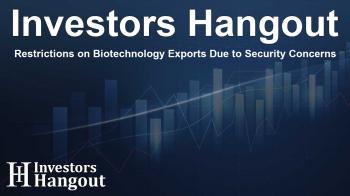Restrictions on Biotechnology Exports Due to Security Concerns

New Export Controls on Biotechnology Equipment
The U.S. Commerce Department recently announced significant restrictions aimed at biotechnology equipment and associated technology. These changes come as part of ongoing national security measures focusing on the intricate relationship between biotechnology and artificial intelligence.
National Security and Biotechnology
Concerns have arisen that advanced biotech tools could be misused in ways that threaten national security. This includes how such technologies may assist in developing sophisticated military capabilities. Authorities are particularly wary of ensuring that U.S. inventions do not empower nations with potentially adversarial intentions.
Potential Military Applications
The primary concern is that countries like China might exploit U.S. technological advances to bolster their military infrastructure. The Commerce Department expressed that laboratory tools could be integral in enhancing human capabilities, advancing brain-machine interfaces, and even creating synthetic materials inspired by biological processes.
Ethical Considerations in Biotech
As biotechnology evolves, so do the ethical considerations surrounding its application. The potential for bioweapons development raises troubling questions about the responsibility of those who create and export such technologies. The United States feels a pressing need to manage these risks actively through regulations.
Global Impact of New Regulations
The implications of these new export regulations extend beyond the U.S. They can influence global trade practices and international partnerships in the biotech field. Countries involved in biotechnology research will need to navigate these constraints carefully, which might affect collaborative efforts and shared innovations.
The Future of Biotechnology Exports
This move signals a pivotal moment in how biotechnologies are regulated on the international stage. Industry leaders and nations reliant on biotech advancements will be closely monitoring the resulting effects on both innovation and security dimensions.
Frequently Asked Questions
What are the new export controls related to?
The new export controls target biotechnology equipment and technology, driven by national security concerns regarding AI and military applications.
Why is the U.S. concerned about biotechnology exports?
The U.S. is concerned that advanced biotech tools could be utilized by nations like China to enhance military capabilities and possibly develop bioweapons.
How could biotechnology be misused?
Biotechnology can potentially be misused for military enhancements, including human performance improvements and the creation of biologically-inspired materials.
What is the global impact of these regulations?
These regulations may complicate international partnerships and trade in biotechnology, affecting global research collaboration.
What should companies do in response to these changes?
Companies must stay informed about the regulations and adjust their export practices to comply with national security measures while continuing to innovate responsibly.
About Investors Hangout
Investors Hangout is a leading online stock forum for financial discussion and learning, offering a wide range of free tools and resources. It draws in traders of all levels, who exchange market knowledge, investigate trading tactics, and keep an eye on industry developments in real time. Featuring financial articles, stock message boards, quotes, charts, company profiles, and live news updates. Through cooperative learning and a wealth of informational resources, it helps users from novices creating their first portfolios to experts honing their techniques. Join Investors Hangout today: https://investorshangout.com/
Disclaimer: The content of this article is solely for general informational purposes only; it does not represent legal, financial, or investment advice. Investors Hangout does not offer financial advice; the author is not a licensed financial advisor. Consult a qualified advisor before making any financial or investment decisions based on this article. The author's interpretation of publicly available data presented here; as a result, they should not be taken as advice to purchase, sell, or hold any securities mentioned or any other investments. If any of the material offered here is inaccurate, please contact us for corrections.
